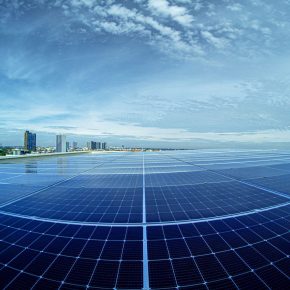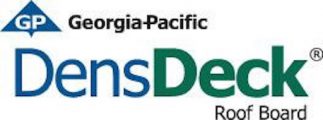
DensDeck: How can you reduce the risk of solar panel roof fires?
To reduce the risk of a solar panel flat roof fire, measures should be taken to prevent electrical arcing [1], as this is the major factor that could cause an outbreak of fire. Georgia-Pacific, the manufacturer of DensDeck explains more…
Arcing occurs where conducting parts in the solar panel flat roof system become separated and current flows across the gap between them through ionisation of the air. These high voltage electrical arcs can produce extremely high temperatures exceeding 6,000°C and, as a PV system is based on direct current (DC) rather than alternating current (AC), the arcing is sustainable. The high temperatures generated can ignite nearby materials causing fire to breakout and spread across the roof.
Faults with electrical connections leading to arcing could be caused by manufacturing errors, damage to equipment during transportation, or when in operation on the roof, and by poor installation of the solar panel system on site.
Therefore, the selection of a quality system manufacturer and experienced installation team can help reduce some of the risks associated with arcing and solar panel roof fires. Specialised equipment specifically designed to enclose key equipment is also available. It can prevent any arcing that may occur from causing a fire to further reduce fire risk.
Once the solar panel system has been selected and installed, maintenance is important to ensure that all equipment is regularly checked and any issues causing concern are rectified. Cleaning is also required, as a build-up of contaminants in the form of oxides on electrical connections leads to the generation of resistive heat that can eventually break down materials and lead to arcing.
Does the presence of solar panels effect the behaviour of solar panel roof fires?
Solar panels effect the fire dynamics of a flat roof. This means that, should a fire break out, regardless of its origin, the panels could increase the severity and damage caused by that fire.
The speed of fire spread across a roof with solar panels can be influenced by the gap between the panels and the roof. If the panels are below a certain height, known as the critical gap distance, then the fire may spread more rapidly. In tests[2] the acceleration of the flame front was up to 38 times faster with solar panels than without, highlighting the importance of ensuring the correct gap height for solar panels is achieved during installation.
The angle of the solar panels also plays a part as the panels can reradiate heat from a fire back down onto the roof surface generating hot spots. Solar panels could hinder the effects to put out a solar panel roof fire and their presence also adds additional fire load to the roof.
These changes in the fire dynamics mean that, even if all the steps are taken to lower the risk of the solar panels themselves starting the fire, a fire from a different source could be more destructive, and harder to extinguish, due to solar panels being in place.
How can fire-resistant roof boards help to further mitigate the risk of solar panel fires?
Given that the risks of a solar panel roof fires cannot be completely eliminated, the use of fire-resistant roof boards between the waterproofing membrane and insulation layer incorporates a layer of fire resistance into the roof to help slow down the fire spread and potentially limit damage should a fire occur on the roof.
DensDeck® Roof Boards are made from a gypsum core and fibreglass mats, both of which are classed as non-combustible. The embedded facers form the first line of defence against a fire followed by the gypsum core.
DensDeck® Roof Boards are used as part of over 398,487[3] flat roof assemblies that achieve a Factory Mutual (FM) Class A fire performance. These assemblies are typically assessed to higher standards than required by building regulations and can give specifiers reassurance that they are selecting a proven system to help mitigate the risks posed by solar panel roof fires.
If you would like to find out how selecting DensDeck® Roof Boards as part of your flat roof specification can help reduce the impact of solar panel roof fires, please contact Georgia-Pacific today for detailed project advice and guidance.
Sources
[1] Fault tree analysis of fires on rooftops with photovoltaic systems – Journal of Building Engineering 29 Nov 2021
[2] Experimental study of flame spread underneath photovoltaic (PV) modules – Journal of Building Engineering 7 May 2020
[3] As of May 2023
Georgia-Pacific Building Products
133 Peachtree Street, NE, Atlanta
GA 30303
(USA) 1-800-225-6119
Visit Supplier's page
Latest news

26th March 2025
BMBI: Builders’ Merchants value sales down -2.3% in January year-on-year, with flat volume sales and prices down -2.3%
The latest Builders Merchant Building Index (BMBI) report shows builders’ merchants value sales in January were down -2.3% compared to the same month in 2024. Volume sales were flat (+0.0%) and prices slipped -2.3%. There was no difference in trading days.
Posted in Architectural Ironmongery, Articles, Bathrooms & Toilets, Bathrooms, Bedrooms & Washrooms, Bricks & Blocks, Building Associations & Institutes, Building Industry News, Building Products & Structures, Building Services, Building Systems, Civil Engineering, Concrete, Cement, Admixtures, Doors, Drainage, Drainage Services, Drainage, Guttering, Soffits & Fascias, Facility Management & Building Services, Fascias, Hand Tools, Hard Landscaping & Walkways, Heating Systems, Controls and Management, Heating, Ventilation and Air Conditioning - HVAC, Information Technology, Interior Design & Construction, Interiors, Kitchens, Landscaping, news, Pipes, Pipes & Fittings, Plant, Equipment and Hire, Plumbing, Posts, Power Tools, Publications, Research & Materials Testing, Retrofit & Renovation, Timber Buildings and Timber Products, Walls, Windows
26th March 2025
Encasement Verta column casings - covering up with style
The demands of architects and specifiers seeking to create stylish finishes on a diverse range of building interior and exterior projects are the main drivers behind the versatility and extensive choice available within the Encasement Verta column casing range.
Posted in Articles, Building Industry News, Building Products & Structures, Canopies, Entrances & Column Casings, Case Studies, Interior Design & Construction, Interiors, Restoration & Refurbishment, Retrofit & Renovation, Walls
26th March 2025
Pyroguard launches on-demand CPD webinar
Pyroguard has launched an on-demand version of its RIBA-approved CPD seminar – ‘Fire safety glazing: a system, not a product’ – in a bid to guide the industry regarding the critical role of fire safety glass.
Posted in Articles, Building Industry Events, Building Industry News, Building Products & Structures, Building Services, Continuing Professional Development (CPD's), Glass, Glazing, Health & Safety, Information Technology, Innovations & New Products, Posts, Retrofit & Renovation, Seminars, Training, Windows
25th March 2025
Reduce sound transference with West Fraser CaberAcoustic
CaberAcoustic from West Fraser is a highly versatile, effective and economical sound-reducing flooring solution. Reducing both impact and airborne transmitted sounds, it can be laid over concrete and timber floors in both new and existing buildings.
Posted in Acoustics, Noise & Vibration Control, Articles, Building Industry News, Building Products & Structures, Building Services, Building Systems, Facility Management & Building Services, Floors, Interior Design & Construction, Interiors, Posts, Restoration & Refurbishment, Retrofit & Renovation, Timber Buildings and Timber Products
 Sign up:
Sign up: 